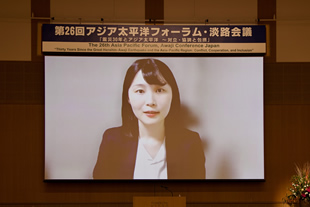 The 24th Asia Pacific Research Prize - Commendation winner: Dr. Madoka Nishiura
The 24th Asia Pacific Research Prize - Commendation winner: Dr. Madoka Nishiura
Title of Dissertation: “ Listening to Signing: The Deafness and the Poetics of Bodies in Bengkala, Bali ”

- Dr. Madoka Nishiura
-
- Career -
Madoka Nishiura, PhD in Arts and Sciences, is a cultural anthropologist focusing especially on anthropology of music and linguistic anthropology. In the final year of her undergraduate education at the Department of Musicology, Tokyo University of the Arts, she received the Ataka Prize. She graduated from the university in 2016. She then moved to the Master’s Program in cultural anthropology at the Graduate School of Arts and Sciences, The University of Tokyo. During her years at the graduate school, she was a research fellow (DC1) under the Research Fellowship for Young Scientists program of the Japan Society for the Promotion of Science from 2018 to 2021 and a visiting fellow at Harvard University from 2021 to 2022 and from 2023 to 2024. She completed the Doctoral Program in cultural anthropology at the same graduate school in 2024. Currently, she is a research fellow at the Graduate School of Arts and Sciences, The University of Tokyo and works as an adjunct lecturer at the Faculty of Sustainability Studies of Hosei University, at the Department of Human Relations of the University of the Sacred Heart, Tokyo, and at the College of Arts and Sciences of Tamagawa University.
- Summary -
This dissertation is an anthropological ethnography of the village of Bengkala in northern Bali, Indonesia, known for its high birth rate of deaf people.Focusing on deafness and sign language communication, it comprises three parts. Part I is dedicated to reviewing previous studies and proposing an original theoretical framework called the “poetics of bodies”. Part II ethnographically portrays the socio-cultural meanings of “deafness” in Bengkala from both local and global perspectives. Part III explores, through detailed case studies, how deaf people have developed effective communicative styles in the local sign language, Kata Kolok, and the socio-cultural effects of those styles.
This study is aimed at making the following three academic and social contributions. First, this dissertation is an ethnography based on the probably first full-scale long-term fieldwork in Bengkala, which is unique in that it has a large population of hereditary deafness. Part II in particular portrays the multi-layered nature of deafness in the village, including the reasons for the large number of deaf people in the village, the reality of the local deaf community, and the roles assigned to deaf people by the village’s customary law, such as serving as grave diggers.
The second intended contribution is to communication studies. This dissertation presents the “poetics of bodies” as a new theoretical perspective, and Part III analyzes in detail the sociopolitical effects of actual sign language communication in Bengkala. This perspective can be applied to a wide range of subjects, such as a variety of sign languages around the world, the corporeal aspects of communication in spoken languages, and various forms of corporeal interactions, including dance.
Thirdly, this dissertation raises ethical issues entailed by interaction with others. This study has revealed that the ethical attitudes of “listeners,” or the interlocutors in communication, are important in both the social status of deafness in Bengkala and the effects of the poetics of bodies. Emphasizing the importance of “listening to signing” as an issue of communicative attitudes and ethics and raising the question of how we can learn to listen to signing. These considerations constitute one of the study’s central—and perhaps most signifcant—contributions.






